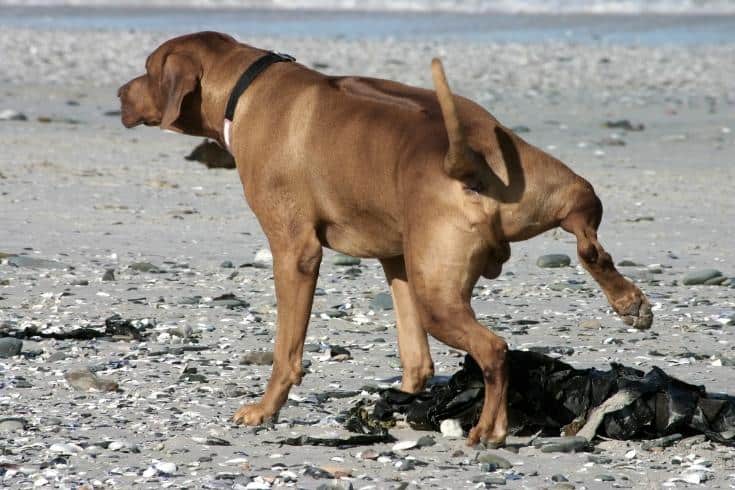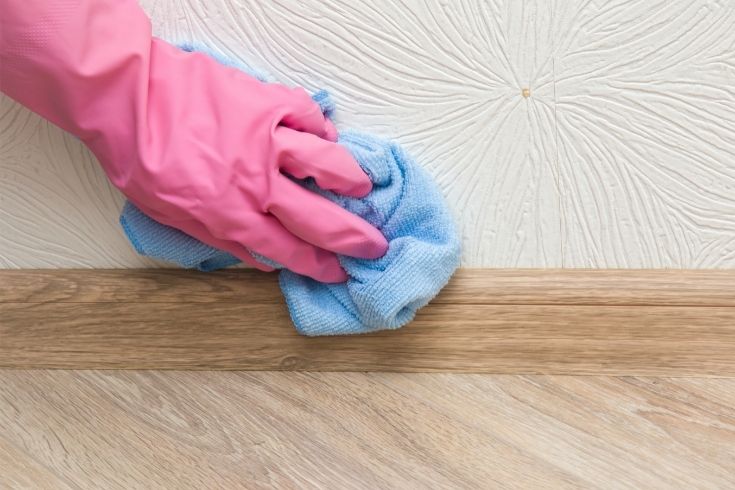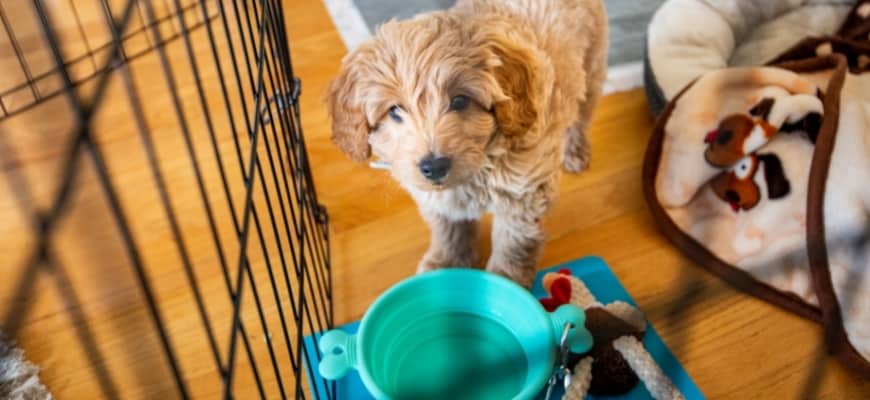Potty training can be a very long & complicated process. For some dogs, potty training is just so much harder to understand, which makes us wish there was some sort of shortcut to help them out.
Is neutering that shortcut? Colloquially, it’s often said that neutered dogs tend to pee in the house less, which makes it easier for them to become house-trained. Is this true?
The short answer is no; neutering will not make potty training any easier. However, you might notice that your dog pees in the house less as he will exhibit less marking behavior.
Will Neutering Help With Potty Training?

A common question that first-time dog owners have is if neutering will make the potty training process any easier.
Neutering is described by the VCA Animal Hospitals as the “surgical procedure during which both testicles are removed in order to sterilize (make infertile) a male dog, therefore stopping its ability to reproduce.”
Neutering could actually lead to tons of different behavioral changes in your pooch, from humping to fighting.
Similarly, neutering can influence your dog’s potty training process.
Potty training is when you teach your pup to hold his bladder in the house & only relieve himself outside. A housebroken dog shouldn’t go potty anywhere you don’t want them to.
So, will neutering help with potty training?
While it won’t make your dog any more trainable, you will notice that your dog is urinating in the house much less. This is because neutering prevents your dog from marking.
So, neutering does not affect potty training, but it could affect your dog’s urinary habits.
What Is Marking?

Dogs exhibit 2 types of urination behaviors. The first is regular urination, which is done to empty your pup’s bladder.
Marking is a specific type of peeing that is usually done by male dogs. It is not done to relieve the bladder; instead, it’s done to mark personal places, sort of like the graffiti you find under a bridge.
It shows other dogs that your pup has been here before & left a little signature!
How Does Neutering Affect Marking?
When you neuter a dog, you cut off his testicles. Since the testicles are what produce your dog’s male sex hormones, this reduces most aggressive/masculine behaviors. Marking is one of these aggressive behaviors.
After you spay your dog, you might notice that your pup displays reduced humping, barking, & dog fighting. This is because these are all behaviors that are testosterone-based.
Similarly, marking is also a testosterone-fueled behavior.
So, once your dog has been spayed, he will display fewer of these behaviors.
There is no scientific consensus on whether or not spaying can influence marking in female dogs.
First of all, marking is displayed much less by bitches, as compared to studs. Moreover, marking may be done by bitches purely for behavioral reasons.
Therefore, changing the hormone levels won’t do anything to reduce this behavior for females.
How Can I Reduce Marking?

So, how can you reduce marking behaviors in your pup to make the potty training process much easier?
- Clean Up
- Make sure that you clean up any puppy accidents immediately. The smell of urine remaining will entice your dog to mark the area again. So, use a stain & smell remover on the affected area as soon as you notice the mess.
- Don’t Bring New Items Into The House
- New objects with a foreign scent are very enticing to dogs. They will want to put their own “cologne” on it through territorial marking. Pet owners should beware of this while bringing things into their pup’s space. Avoid leaving things like backpacks, other dog toys, and used clothes on the floor where your dog can get to them.
- Introduce New Animals Slowly
- New animals can make your pup feel territorial & put them in the marking mindset. So, introduce new animals to the household slowly. Start by introducing the other animals’ scent to your pup. Then, leash both animals and put them in the same room so that they can see & smell each other. Finally, you can supervise them in the same room and allow them to touch each other. By introducing them in increments, your dog is less likely to perceive the other animal as a threat and is, therefore, less likely to mark.
- Stop It As Soon As It Happens
- If your dog has been marking in the house for months or years, they are extremely likely to continue marking even after being neutered. This becomes a habitual behavior, & your pup will turn to it when they feel overwhelmed or anxious. So, don’t let marking go unnoticed. Make sure you properly reprimand your pooch when you notice any territorial urination.
How Does Neutering Affect Potty Training?

Neutering your dog will not affect how quickly they are able to pick up potty training.
That is a skill based on your dog’s response to training, their willingness to learn, their attention span, and their motivators.
Some dogs really like being rewarded with treats, so they will respond well to food-based rewards. Others prefer pats on the head, and some may just like words of positive affirmations like “good boy.”
Finding your dog’s ideal motivator will help you understand how to speed up the housebreaking process & make your dog respond better to training.
Some people believe that neutered dogs are less aggressive and therefore, easier to train. However, there is no real scientific consensus on this relation in the dog training world.
Commonly Asked Questions
These are some frequent queries by owners who are new to potty training.
How long will it take to potty train my dog?
The process of potty training your pup can take a few months. It typically takes about 4-6 months, but this is dependent on your dog’s ability to pick up training.
You can speed up the process by finding your dog’s favorite motivator & using it to promote urinating outdoors.
When I was starting to housebreak my dog, I noticed that he liked playtime the most. So, whenever he responded to the “Go Potty” command, I would give him tons of verbal affirmations & then start playing catch with him.
Thanks to this, he was able to pick up potty training in just a few months!
Also, smaller dogs may take longer to become potty trained. This is because they have smaller bladders and therefore need to relieve themselves more frequently. It’s harder for them to hold on to their urine overnight or for longer periods of time.
If you start potty training your dog at a young age when they are more receptive to training techniques & don’t have fixed urination habits, then it may be easier to train them.
However, remember that it’s never too late to start potty training your pooch! If you’ve adopted a rescue or an older dog, it’s crucial to start the potty training process as soon as they enter your home to change their habits.
Will neutering change how my dog pees?
Neutering has the ability to change how your dog pees if he is neutered before he reaches maturity. Dogs that are neutered before they reach sexual maturity may never develop the habit of lifting their leg to pee.
These dogs may squat or stand normally to pee, like most females. However, if you neuter your dog after they reach sexual maturity, his peeing position is usually unaffected.
Female dogs typically won’t change their peeing position after being spayed.
Should I let my dog go in the house as he recovers from surgery?
If your dog is recovering from neutering surgery, then every small step could be immensely painful for him. It’s recommended that you keep your pup crated or enclosed in a small room so that the wound can heal properly.
Similarly, you should allow your puppy to go indoors on puppy pads so that they don’t exert themselves too much going in and out of the house. This is especially true if you live in an apartment with lots of flights of stairs.
Continue the potty training by using verbal cues like “Go Potty” or “Make” whenever your pooch goes on the puppy pad as well.
How do I clean a marked bed?
If your dog is struggling with potty training, you would be cleaning up their beds & crates time after time.
To speed up the process, immediately make a mixture of baking soda & vinegar and dab it on the urine stain.
This will kill any odors & lift stains. Then, throw the bed in the wash. You could also spot-clean with a clean washcloth, some pet-friendly detergent, water, & tons of elbow grease!
To clean a marked area of the house, ensure that you use an odor remover so that your pup won’t smell it, which will compel them to pee there more frequently.
Conclusion
Neutering can be a difficult time for pet parents because it’s usually the first real surgery in their puppy’s life. Neutering can change a lot of things about a dog’s behavior, but it typically won’t affect their receptiveness to potty training.
However, it may reduce marking behaviors in male dogs, which could change how much they pee indoors.
If you found this article informative, share it with friends. If you have any potty training tips or advice on how to care for a neutered dog, please leave a comment down below.
Thanks for reading!
